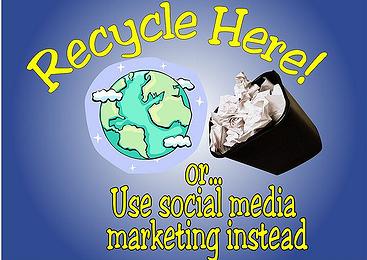
WASHINGTON, DC, October 1, 2012 (ENS) – Marketers can no longer make broad, unqualified claims that a product is “environmentally friendly” or “eco-friendly,” under revised Green Guides issued today by the Federal Trade Commission.
Instead, marketers should qualify general claims with specific environmental benefits presented in a “clear, prominent” manner to ensure they are truthful and are not deceptive.

For instance, “Claiming ‘Green, made with recycled content’ may be deceptive if the environmental costs of using recycled content outweigh the environmental benefits of using it,” the FTC advises.
The new Green Guides include updates to the existing guides, last revised in 1998, as well as new sections on the use of carbon offsets, certifications and seals, non-toxic claims, and renewable energy and renewable materials claims.
The Green Guides are not agency rules or regulations. Instead, they explain how truth-in-advertising principles apply to green marketing. They describe the types of environmental claims the FTC may or may not find deceptive under Section 5 of the FTC Act, which empowers the agency to take enforcement action against deceptive claims.
The Commission can issue orders prohibiting deceptive advertising and marketing and can impose fines if those orders are violated.
“The introduction of environmentally friendly products into the marketplace is a win for consumers who want to purchase greener products and for producers who want to sell them,” said FTC Chairman Jon Leibowitz.
“But this win-win can only occur if marketers’ claims are truthful and substantiated,” Leibowitz said. “The FTC’s changes to the Green Guides will level the playing field for honest business people and it is one reason why we had such broad support.”
The Guides issued today take into account 340 public comments that the FTC calls “unique” and more than 5,000 total comments received since the FTC released its proposed revisions in the fall of 2010.
The guides also include information gathered from three public workshops and an FTC study of how consumers perceive and understand environmental claims.
The consumer perception study confirms that claims such as “environmentally friendly” or “eco-friendly” are likely to suggest that the product has specific and far-reaching environmental benefits.
“Very few products, if any, have all the attributes consumers seem to perceive from such claims, making these claims nearly impossible to substantiate,” the FTC said in a statement announcing the new guides.

The new Green Guides advise marketers not to make an unqualified degradable claim for a solid waste product unless they can prove that the entire product or package will completely break down and return to nature within one year after customary disposal.
They caution that items destined for landfills, incinerators, or recycling facilities will not degrade within a year, so marketers should not make unqualified degradable claims for these items.
The new guides clarify standards for compostable, ozone, recyclable, recycled content, and source reduction claims.
For example, the FTC advises, “If recycling facilities for a product are not available to at least 60 percent of consumers or communities, a marketer can state, ‘This product may not be recyclable in your area.’ If recycling facilities for a product are available to only a few consumers, a marketer should use stronger qualifying language: ‘This product is recyclable only in the few communities that have appropriate recycling programs.'”
The new section on certifications and seals of approval emphasizes that certifications and seals may be considered endorsements that are covered by the FTC’s Endorsement Guides. It includes examples that illustrate how marketers could disclose a “material connection” that might affect the weight or credibility of an endorsement.
Marketers are cautioned not to use environmental certifications or seals that lack clarify on the basis for the certification, because such seals or certifications are likely to convey general environmental benefits.
The guides do not address use of the terms “sustainable,” “natural,” and “organic,” either because the FTC lacks sufficient basis to provide meaningful guidance or wants to avoid proposing guidance that duplicates or contradicts rules or guidance issued by other agencies.
Organic claims made for textiles and other products derived from agricultural products are covered by the U.S. Department of Agriculture’s National Organic Program.
The Federal Trade Commission first issued its Green Guides in 1992 to help marketers avoid making misleading environmental claims. It revised the Guides in 1996 and 1998. The guides issued today supercede the 1998 versions.
Copyright Environment News Service (ENS) 2012. All rights reserved.
© 2012, Environment News Service. All rights reserved. Content may be quoted only with proper attribution and a direct link to the original article. Full reproduction is prohibited.
